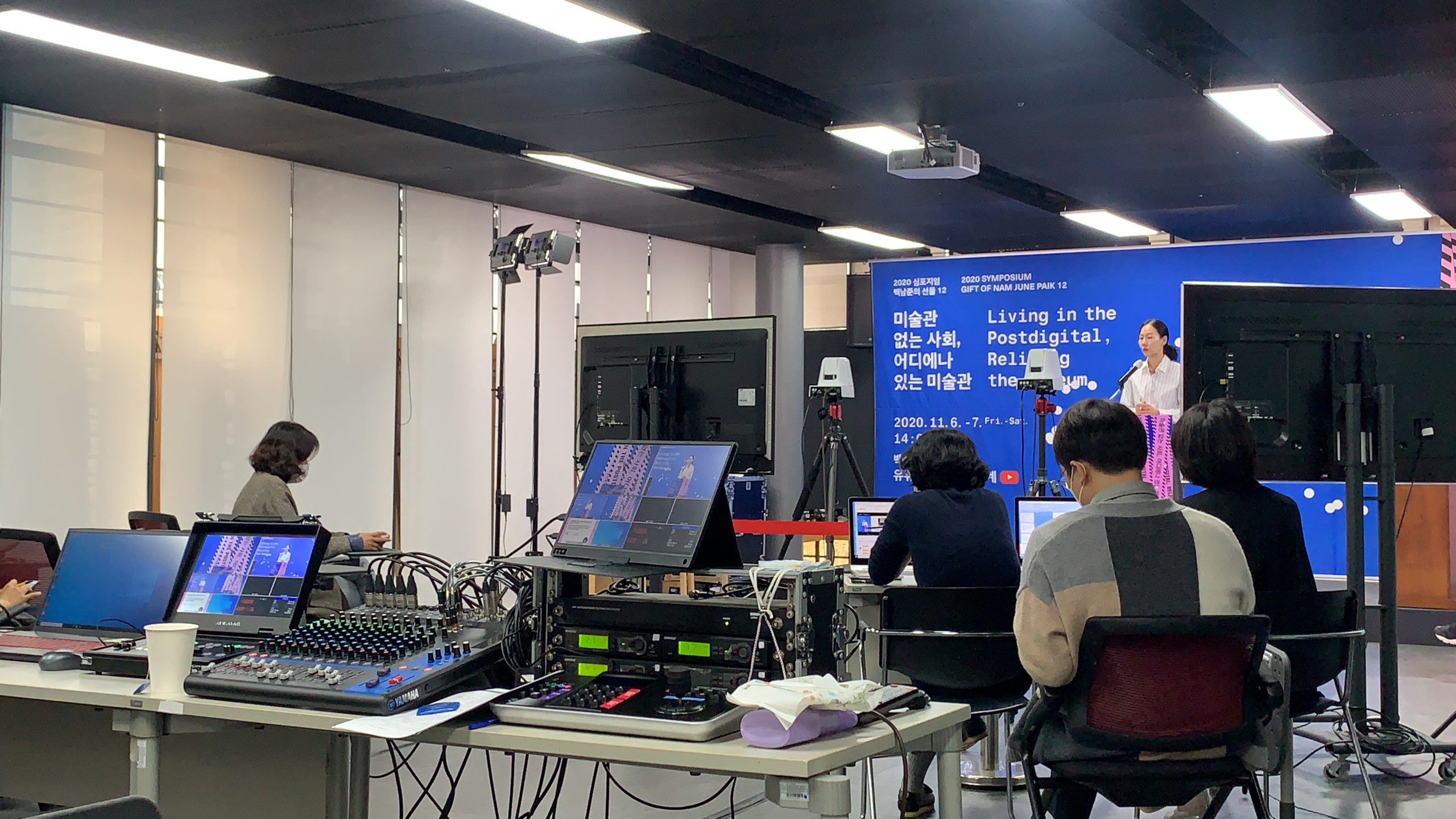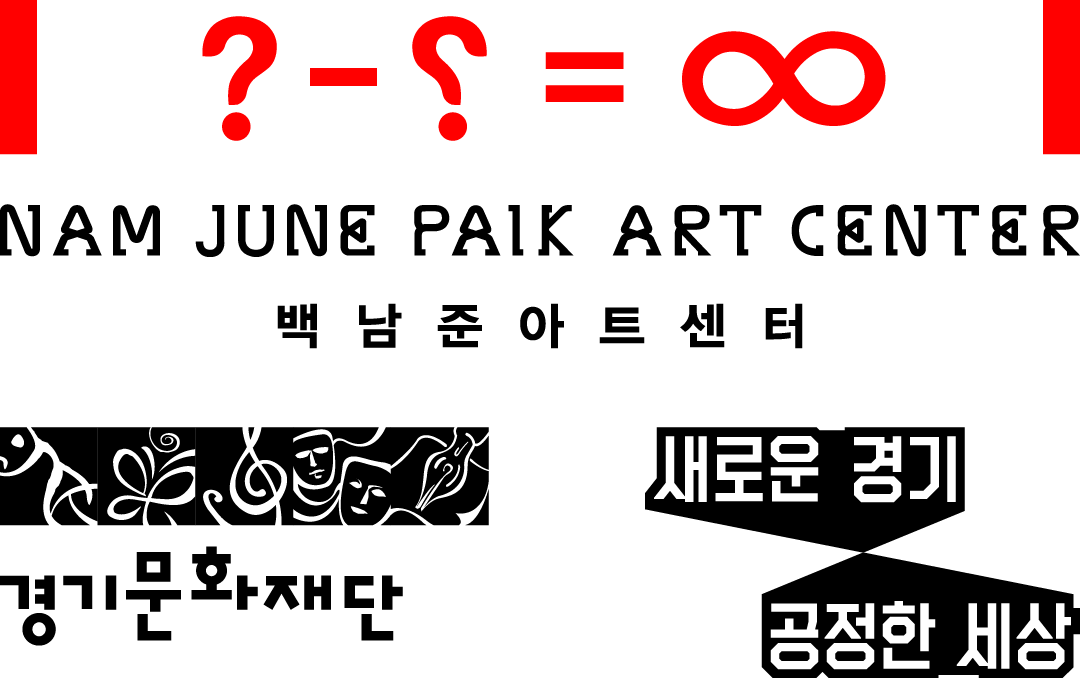
Symposium
Living in the Postdigital, Reliving the Museum
Nov 6 ― Nov 7, 2020
SYMPOSIUM : GIFT OF NAM JUNE PAIK 12
Date
November 6 – 7, 2020, 2pm
Venue
Nam June Paik Art Center Youtube Live
Contributors
Lee Kwang-Suk, Shim Hyowon, Yoo Hyun-Joo, Kim Haeju, Yangachi, Unmake Lab, Siegfried Zielinski, Wendy Hui Kyong Chun, Yuk Hui
Curator
Kim Yoonseo
Organized and Hosted by
Nam June Paik Art Center, Gyeonggi Cultural Foundation
Lee Kwang-Suk

Lee Kwang-Suk has conducted studies and written extensively as a critic on the interface of technology, society, and arts & culture. Lee is associate professor in the Graduate School of Public Policy and Information Technology at Seoul National University of Science and Technology. Lee earned his Ph.D. in Radio-TV-Film at the University of Texas at Austin. He is working as an editorial board member (Jan 2017 ~ present) of Internet Histories: Digital Technology, Culture & Society, and also as a co-editor-in-chief of Culture/ Science, the 28-years long radical journal of cultural theory in Seoul (Jan 2020 ~ present). His research areas include critical studies of technology, platform labor culture in East Asia, techno-subculture, the commons, the Anthropocene, and critical making.
Shim Hyowon

Shim Hyowon received her Ph.D. in pre-cinema media studies at the Interdisciplinary Programme of Comparative Literature at Yonsei University Graduate School. She has since lectured at many universities, including Kookmin University, Kyung Hee University, and Yonsei University. She is interested in observing the cultural, social, and natural circulation of media. She has written academic essays that include “Anthropocene and 21st Century Interdisciplinary Approach: Focusing on Chakrabarty, Parikka and Haraway” and “On Marshall McLuhan’s Media Theory and the Concept of World Cinema in the 1960s and ‘70s”, and co-authored a Korean book, The Front Line of 21st Century Ideas. In addition, she is the translator of books such as Embracing Parallel Worlds (co-translation), and Jussi Parikka’s A Geology of Media (forthcoming).
Yoo Hyun-joo

Yoo Hyun-joo graduated from Yonsei University’s Department of German Language and Literature and the graduate school of the same university before she received a Ph.D. from Humboldt University of Berlin’s Department of German Studies and Linguistics. She is currently a professor at Yonsei University’s Department of German Language and Literature. She is the co-author of the Korean book Friedrich Kittler, and the author of Text, Hypertext, Hypermedia and Hypertext: Keywords of Digital Aesthetics. She also co-translated books such as Grammophon, Film, Typewriter and Ästhetik der Medialität, and translated Die Wirtschaft des Unsichtbaren into Korean.
Kim Haeju

Kim Haeju is a curator based in Seoul, currently working as the deputy director of Art Sonje Center (July 2017-present). She is in charge of the organization of exhibitions and programs as well as the operation of the art center. She is especially interested in the way movements are generated within diverse forms of art. Through writing and curating, she is trying to reveal scenes that combine words and images about the body, time, memory, migration, language, and coexistence. At Art Sonje Center, Kim has curated exhibitions, including Dust,Clay, Stone (2020), Night Turns to Day (2020), The Island of the Colorblind (2019), as well as solo exhibitions of artists such as Koki Tanaka: Vulnerable Histories (2020), Hwayeon Nam: Mind Stream (2020), Donghee Koo, Delivery (2019), Lee Kit: Resonance of a Sad Smile (2019), and the exhibition and performance program that crosses over performance and various mediatic characteristics of visual arts, Moving/Image (Seoul Art Space Mullae 2016; Arko Art Center 2017; SeMA 2020).
Yangachi

Starting with Net.Art, surveillance, hacking, and e-government, the artist Yangachi gave attention to tactical media and locative media. Later, he declared media art is that which excludes electric and electronic elements. Yangachi has exhibited works such as Middle Corea, Bright Dove Hyunsook, and A Night of Burning Bone and Skin. Recently, he is working on a project called “Galaxy” that is related to AI, mobility, energy, robots, and smart cities.
Unmake Lab

Unmake Lab is interested in newly emerging occurrences among humans, technology, nature and society, and turns them into exhibitions, as well as education and research opportunities. They are especially interested in a variety of different spaces, labor, and nature—all of which are newly created under the influence of data and algorithms—and observe how these are returned to us through what has happened in the past. They make different predictions by passing these observations through different algorithms.
Siegfried Zielinski

Siegfried Zielinski is Michel Foucault Professor of Media Archaeology & Techno-Culture at the European Graduate School (CH), honorary doctor and professor of the Budapest University of Arts, and Professor emeritus of media theory at Berlin University of the Arts.
He was founding rector (1994–2000) of the Academy of Media Arts Cologne, director of the Vilém Flusser Archive (1998-2016) and rector of the Karlsruhe University of Arts & Design (2016-2018). Zielinski has published extensively on the archaeology and variantology of the arts and media.
Wendy Hui Kyong Chun

Wendy Hui Kyong Chun is the Canada 150 Research Chair in New Media at Simon Fraser University, and leads the Digital Democracies Group which was launched in 2019. The Group aims to integrate research in the humanities and data sciences to address questions of equality and social justice in order to combat the proliferation of online “echo chambers,” abusive language, discriminatory algorithms and mis/disinformation by fostering critical and creative user practices and alternative paradigms for connection.
Yuk Hui

Yuk Hui studied Computer Engineering and Philosophy at the University of Hong Kong and Goldsmiths College in London, and wrote his doctoral thesis under the French philosopher Bernard Stiegler. Between 2012 and 2018 he taught at the Institute of Philosophy and Art (IPK) of the Leuphana University in Lüneburg, where he also wrote his habilitation thesis in philosophy; in 2019 he was visiting associate professor at the School of Creative Media at the City University of Hong Kong. Previous to that, he was researcher at the Institute for Culture and Aesthetics of Media (ICAM), postdoctoral researcher at the Institute for Research and Innovation of the Centre Pompidou in Paris and a visiting scientist at the Deutsche Telekom Laboratories in Berlin.
The 12th edition of Nam June Paik Art Center’s symposium series Gift of Nam June Paik explores how museums linked to technology are moving forward, under the theme of “Living in the Postdigital, Reliving the Museum.” Paik’s way of thinking and questioning can lead us to face things that we have never seen before and to turn them into imagination and then into new realities. Together with scholars in the fields of technology and culture, and with curators and artists, this symposium imagines a society without museums in the middle of the pandemic, and asks if the online environment and immaterial museums in it are actually accessible to everyone and everywhere. We will reflect on the readiness to encounter others, to share something with others in the end, which is the immanent nature of art, and will discuss different possibilities of bodily experiences in the future museum.
Session 1. Postdigital Museum-Technology-Audience
| 14:00 | Opening Address | Kim Seong Eun Director, NJP Art Center |
| 14:05 | Greetings from Berlin | Siegfried Zielinski Berlin University of the Arts |
| 14:10 | Future Museums as the Commons to Cultivate a Convivial Sense via Technology | Lee Kwang-Suk Seoul National University of Science & Technology |
| 14:50 | The User-Viewer at Web-based Museums in the Post-media Era | Shim Hyowon Kookmin University |
| 15:30 | The Development of Digital Media and the Future of Interactive Museums: Looking beyond Superficiality | Yoo Hyun-Joo Yonsei University |
| 16:10 | Conversation with Kim Seong Eun and Q&A | |
Session 2. A Willingness to Share with Others
| 14:00 | Introduction | Kim Yoonseo Curator, NJP Art Center |
| 14:03 | Fear of an Acoustic Planet | Kim Haeju Deputy director, Art Sonje Center |
| 14:40 | Paik/Abe Video Synthesizer, Willy-Nilly Version and Eight Stories | Yangachi Artist |
| 15:20 | Apophenia and the Sisyphus Dataset | Unmake Lab Artist |
| 16:00 | Conversation with Kim Yoonseo and Q&A | |
Three speakers overseas will contribute to this symposium with writings for a symposium-linked web journal. The full text of their papers will be published after the symposium ends, in NJP Reader #10 accessible at Nam June Paik Art Center’s website in the spring of 2021.
Foreign Contributions
| Future Museums as Generators of Surprises | Siegfried Zielinski Berlin University of the Arts |
| Lessons from Machine Unlearning in the Context of the Museum | Wendy Hui Kyong Chun Simon Fraser University |
| Exhibiting and Sensibilizing | Yuk Hui City University of Hong Kong |
The symposium will be delivered in Korean via the official NJP Art Center YouTube channel.
The symposium joins the UNESCO world cultural movement “ResiliArt,” and the completion of the debate will be analyzed and shared with UNESCO’s Member States and decision makers.



